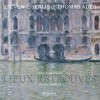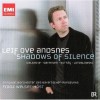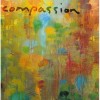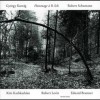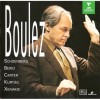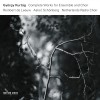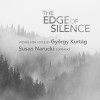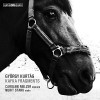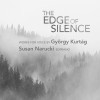| Country: | Hungary |
| Period: | Contemporary classical music |
Biography
György Kurtág (Hungarian: [ˌɟørɟ ˈkurtaːɡ]; born 19 February 1926 in Lugoj) is a Hungarian composer.
György Kurtág was born in Lugoj in the Banat region, Romania.[1] In 1946, he began his studies at the Franz Liszt Academy of Music in Budapest, where he met his wife, Márta, and also György Ligeti, who became a close friend. His piano teacher at the academy was Pál Kadosa; he studied composition with Sándor Veress and Ferenc Farkas, chamber music with Leó Weiner, and theory with Lajos Bárdos. He graduated in piano and chamber music in 1951 and received his degree in composition in 1955.[2]
Following the Hungarian uprising in 1956, Kurtág’s time in Paris between 1957 and 1958 was of critical importance for him. Here, he studied with Olivier Messiaen and Darius Milhaud. During this time however, Kurtag was suffering from a severe depression: 'I realized to the point of despair that nothing I had believed to constitute the world was true...'. Kurtág received psychological therapy from Marianne Stein – an encounter that revivified the composer and strongly stimulated his artistic development.[1] During this time he also discovered the works of Anton Webern and the plays of Samuel Beckett. The String Quartet he composed in 1959 after his return to Budapest marks this crucial turning point; he refers to this piece as his Opus 1. He dedicated it to his therapist, Stein.[3]
Between 1960 and 1968, he worked as répétiteur at the National Philharmonia in Budapest.[1] In 1967, he was appointed professor of piano and later also of chamber music at the Franz Liszt Academy, where he taught until 1993.[1]
Kurtág’s international reputation began to take hold with Messages of the Late Miss R.V. Troussova for soprano and chamber ensemble, which had its premiere in Paris in 1981. Since the early 1990s, he has worked abroad with increasing frequency: he was composer in residence at the Berlin Philharmonic (1993–95) and the Vienna Konzerthaus Society (1995).[2] He then lived in the Netherlands (1996–98), again in Berlin (1998–99) and upon invitation by Ensemble InterContemporain, Cité de la Musique and Festival d’Automne, in Paris (1999–2001). György Kurtág and his wife have lived near Bordeaux since 2002.
The compositions before Opus 33, the orchestral work Stele dedicated to Claudio Abbado and the Berlin Philharmonic, consist mainly of vocal solo and choral music, and of instrumental music, ranging from solo pieces to works for ensembles of increasing size. In several of Kurtág’s pieces, space plays an important role: … quasi una fantasia…, premiered in 1988 at the Berlin Festival, is the first composition in which he explores the idea of music that spatially embraces the audience. Since Op. 33 a number of large scale compositions have been premiered, such as e.g. Messages Op. 34 and New Messages Op. 34a for orchestra, the Beckett settings pas a pas – nulle part Op. 35, the double concerto …concertante… Op. 42 and 6 Moments musicaux Op. 44 for string quartet.
Kurtág is the recipient of numerous awards, including the Officier of the Ordre des Arts et des Lettres in 1985, the Kossuth Award of the Hungarian government for his life’s achievement in 1996, the Austrian “Ehrenzeichen” and the Ernst von Siemens Music Prize in 1998. In addition, Kurtág is a member of the Bavarian Academy of Fine Arts, Munich, and of the Akademie der Künste, Berlin (both since 1987), and he was named an Honorary Member of the American Academy of Arts and Letters in 2001. In 2006 he received the Grawemeyer Award for his composition …concertante… op. 42 for violin, viola and orchestra.
Invited by Walter Fink, he was the 14th composer featured in the annual Komponistenporträt of the Rheingau Musik Festival in 2004. The Ensemble Modern and soloists performed his works op. 19, op. 31b and op. 17. On the occasion of his 80th birthday in February 2006, the Budapest Music Centre honoured György Kurtág with the celebration of a festival in his hometown. The same year’s editions of Musikfest Berlin, Vienna modern, Holland Festival and Festival d’Automne in Paris dedicated special programmes to György Kurtág. Kurtág often holds master-classes in chamber music, and appears in concerts together with his wife Márta. The couple plays an always-renewing selection of pieces for two and four hands from Játékok (Games) and transcriptions. The later volumes of Játékok bears the sub-title Diary Entries and Personal Messages. This, to some extent, reveals the lineage of the unique microcosms, which irresistibly involves the listener at recitals by Márta and György Kurtág.
Most of Kurtág's music is published by Editio Musica Budapest, some at Universal Edition, Vienna, some at Boosey & Hawkes, London.







